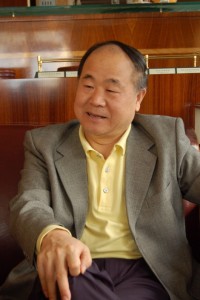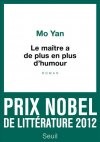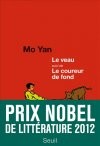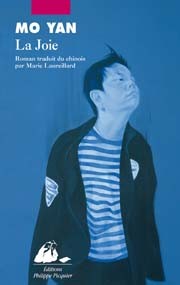 When we speak of Mo Yan we specially mention his novels, his “long” novels which sometimes and wrongly scare away some readers. But he wrote more than a hundred short stories and many “short” novels and novellas. As he mentions in his foreword to “Shifu …”, a collection of short stories published in the United States: “the stature of a writer can only be determined by the thought revealed in a work, not by its length. A writer’s place in a nation’s literary history cannot be judged by whether or not he is capable of writing a book as heavy as a brick. “
When we speak of Mo Yan we specially mention his novels, his “long” novels which sometimes and wrongly scare away some readers. But he wrote more than a hundred short stories and many “short” novels and novellas. As he mentions in his foreword to “Shifu …”, a collection of short stories published in the United States: “the stature of a writer can only be determined by the thought revealed in a work, not by its length. A writer’s place in a nation’s literary history cannot be judged by whether or not he is capable of writing a book as heavy as a brick. “
1 / A gem: “The master has more and more humor.”
This 1999 text, translated in French by Noël Dutrait is one of the best known (The English translation by Howard Goldblatt is “Shifu, you’ll do anything for a laugh”). This is one of the few short stories that does not deal with countryside, but focuses on plants that are closing and layoffs. Ding Shikou, a model worker, was dismissed a few months before his retirement, despite the promises by factory management and the comforting words of the municipality.
As his former colleagues, he has no alternative but to create a small business.
An old disused bus in the woods is turned into a little “love nest” that rents by the hour, the success of this capitalist venture is immediate and lasts all summer. The coming winter and a couple that lingers on will make his life more difficult. We are not in for exposure or realism, but for humor and even a policeman comes for help to Ding Shikou without a bribe …
2 / Castration for “The Calf “
This short story written in 1998, supplemented by “The runner” has just been published in France by Le Seuil in a translation by François Sastourné.
 In a commune of 70,000 people, lack of fodder stops developping the herd, so it is decided to castrate three calves. A teenager, Luo Han is a privileged witness; calves accuse him of abandoning them. We will learn everything about castration and recipes for cooking testicles, but the wounds become infected
In a commune of 70,000 people, lack of fodder stops developping the herd, so it is decided to castrate three calves. A teenager, Luo Han is a privileged witness; calves accuse him of abandoning them. We will learn everything about castration and recipes for cooking testicles, but the wounds become infected
More than twenty kilometers with the calves to find the veterinarian who operated. Mo Yan then draws up a cynical portrait of communes: irresponsibility and lies, the only worthwhile goal is to protect oneself, and a scapegoat will have to be found …
The text is lively, with humorous dialogues which are read with great pleasure.
“The runner” is less attractive, Mo Yan pays a tribute to his teacher Zhu Zongren and to the “rightists” of a work camp in the neighborhood who had a positive impact on the villages and schools. “My father said: what do you think, it is not so easy to be classified a rightist. You must have talents. “
 Many pleasant portraits of rightists, bureaucrats, teachers, participants in a sports competition. But many side comments, we get a bit lost. It seems sometimes written in a hurry and less humorous.
Many pleasant portraits of rightists, bureaucrats, teachers, participants in a sports competition. But many side comments, we get a bit lost. It seems sometimes written in a hurry and less humorous.
3 / “Child of iron” and fifteen other short stories:
This collection, translated into French by Chantal Chen-Andro and published by Le Seuil in 2004, provides some beautiful texts. All episodes relate to the countryside except “Iron Child”, a fantastic story during the Great Leap Forward, the frenzy of steel production that mobilizes the peasants at the expense of farm work and preparing the great famine that will follow.
Narrators or spectators are usually children and Mo Yan remembers the hunger that was his obsession at that time; it is a core topic just as ancient traditions that crush people.
Only women rebell and sometimes win the case (“The millstone”). Preference for boys and birth control policy is a long time topic in the novella “The Roadworks” translated in 1993 by Chantal Chen-Andro or in the short story “The abandoned baby.”
 Mo Yan, although he admits regret not having a boy, has always had a very clear attitude (and as soon as 1985 in “Explosion”) on abuse of birth control policy.
Mo Yan, although he admits regret not having a boy, has always had a very clear attitude (and as soon as 1985 in “Explosion”) on abuse of birth control policy.
The political classification of families in social groups (poor peasants, medium poor, landowners …), the violence of class struggle, even at school, often have tragic consequences (“The dried up river”, “First Love” ).
He also reminds us of the role of the “educated youth” who were sent to the countryside to be reeducated by peasants, and who were unable to integrate or to return to the city (“Love Story”). Sometimes the short story is very traditional in its progress and fall (“The butcher’s daughter”), sometimes Mo Yan gets us lost in side stories for at the end fall back on his feet! Sometimes he uses and abuses of supernatural, magical “realism”, but how to blame him when we read beautiful pages of dialogues between humans and animals, on ancestral superstitions …
4 / Short stories and novellas:
Four books published in France by Philippe Picquier are worth quoting: “The crystal carrot” (1984) became a classic in China, and since the Nobel prize, is inclosed in the school curriculum! Blackie, a child abused by his stepmother, is the hero of this short story, very descriptive, full of noise, water and wind … Blackie is struggling to find his place in the adult world and his, sometimes unpredictable reactions, makes the position of those who protect him in a roadwork or in a forge, sometimes difficult.
A collection translated in 2011, “The beauty riding a donkey … ” by Marie Laureillard is for some less attactive but two short stories” Woman with a bouquet of flowers “and especially” The handcuffs “deserve careful reading.
 Two short novels were published: a beautiful novella, “Joy”, translated in 2007 by Marie Laureillard which we have mentioned some years ago. “The treasure map” is less appealing but very original: the hero must handle the conversation, the verbal logorrhea of a childhood friend met by accident; a fantastic tale which can eventually get us a bit tired.
Two short novels were published: a beautiful novella, “Joy”, translated in 2007 by Marie Laureillard which we have mentioned some years ago. “The treasure map” is less appealing but very original: the hero must handle the conversation, the verbal logorrhea of a childhood friend met by accident; a fantastic tale which can eventually get us a bit tired.
Finally, we can only regret the castrated publication of “Red Sorghum”, his most famous novel, as the film shot by Zhang Yimou was a great international success. Therefore, “Le clan du sorgho” published by Actes Sud in 1990 gives only a truncated idea as publishing only one of the five parts of the book which, fortunately, was translated in the United States by Howard Goldblatt in 1993.
Yet it is one of the finest novels by the author, full of sound and fury. The themes of the war of resistance against Japan, the symbols, the supernatural, the role of the mother, mother earth, everything is already outlined in this novel far more descriptive than most of his recent books, full of smells and sensations.
Bertrand Mialaret





